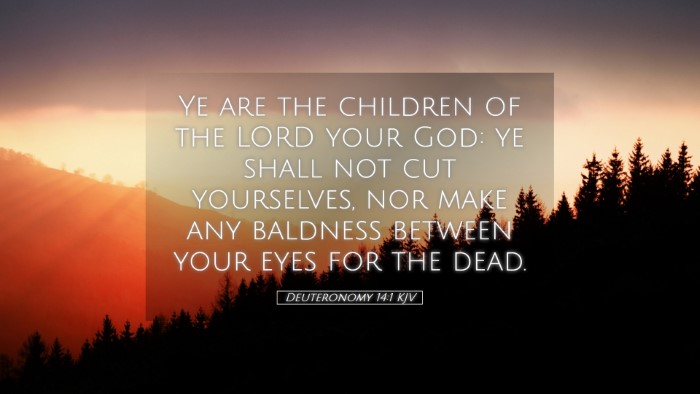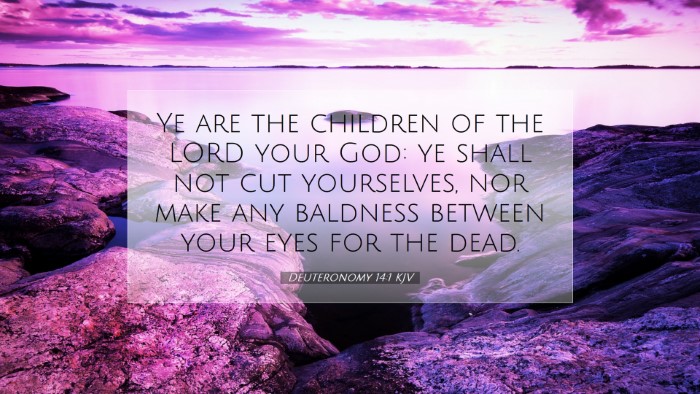Commentary on Deuteronomy 14:1
Deuteronomy 14:1 states: "Ye are the children of the LORD your God: ye shall not cut yourselves, nor make any baldness between your eyes for the dead." This verse is part of a larger section in Deuteronomy that outlines the laws and guidelines for the Israelites, emphasizing their special relationship with God.
Context and Significance
This verse serves as a reminder of Israel's unique identity as the chosen people of God. It highlights the importance of maintaining a distinctive lifestyle in accordance with divine commandments. The prohibitions mentioned reflect practices common amongst pagan religions, signaling a clear demarcation between the Israelites and their surrounding nations.
Analysis and Insights
-
Identity as God's Children
Matthew Henry notes that the phrase "children of the LORD your God" conveys an intimate relationship between God and His people. This status obligates them to live in a manner that reflects their divine lineage.
-
Prohibitions Against Pagan Practices
Both Albert Barnes and Adam Clarke emphasize that the practices of cutting oneself and shaving one’s head were associated with mourning rituals of the Canaanite religions. Such acts were often meant to appease their gods or show grief but were not consistent with the worship of the true God.
-
Call to Holiness
This verse is a call for holiness and distinctiveness. As Matthew Henry argues, the Israelites were to be separate from the nations around them, not only in worship but also in conduct. Their behaviors were to reflect their status as God’s chosen ones.
Theological Implications
This verse raises crucial theological points regarding identity and behavior in the covenant relationship. The calling of the Israelites to avoid pagan customs serves as a prototype for believers today. It reinforces the idea that identity in God should influence lifestyle choices, promoting spirituality over cultural conformity.
Modern Application
-
Understanding Our Identity
Contemporary believers can draw parallels to their identity as children of God, understanding the responsibilities that come with such a title. It prompts a self-reflection on how personal and corporate identities are presented in daily life.
-
Resisting Cultural Pressures
This call for distinctiveness serves as a challenge to resist the pressures of modern society that may encourage conformity to worldly practices that contradict biblical values.
Conclusion
Deuteronomy 14:1 is a powerful reminder of the sacred identity believers hold as children of God and the expectations that come with that identity. It teaches that God desires a community that reflects His holiness, setting itself apart from cultural norms that contradict divine commands. Ongoing reflection on this passage can inspire contemporary Christians to pursue lives that honor their calling and maintain the teachings of Scripture.


